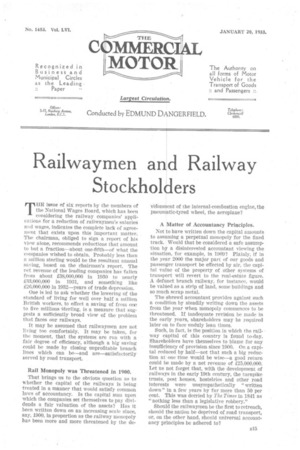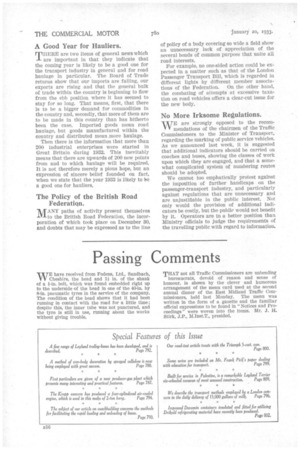Railwaymen and Railway Stockholders
Page 29

Page 30

If you've noticed an error in this article please click here to report it so we can fix it.
THE issue of six reports by the members of the National Wages Board, which has been considering the railway companies' applications for a reduction of railwaymen's salaries and wages, indicates the complete lack of agreement that exists upon this important matter. The chairman, obliged to sign a report of his view alone, recommends reductions that amount to but a fraction—about one-fifth—of what the companies wished to obtain. Probably less than a million sterling would be the resultant annual saving, based on the chairman's report. The net revenue of the leading companies has fallen from about £38,000,000 in 1930 to nearly 133,000,000 in 1931, and something like £26,000,000 in 1932—years of trade depression.
One is led to ask whether the lowering of the standard of living for well over half a million British workers, to effect a saving of from one to five millions lterling, is a measure that suggests a sufficiently broad view of the problem that faces our railways.
It may be assumed that railwaymen are not living too comfortably. It may be taken, for the moment, that the systems are run with a fair degree of efficiency, although a big saving could be made by closing unprofitable branch lines which can be—and are—satisfactorily served by road transport.
Rail Monopoly was Threatened in 1900.
That brings us to the obvious question as to whether the capital of the railways is being treated in a manner that would satisfy common laws of accountancy. Is the capital sum upon which the companies set themselves to pay dividends a fair valuation of the assets? Has it been written down on an increasing scale since, say, 1900, In proportion as the railway monopoly has been more and more threatened by the de velonment of the internal-combustion engine, the pneumatic-tyred wheel, the aeroplane?
A Matter of Accountancy Principles.
Not to have written down the capital amounts to assuming a perpetual monopoly for the fixed track. Would that be considered a safe assumption by a disinterested accountant viewing the situation, for example, in 1909? Plainly, if in the year 2000 the major part of our goods and passenger transport be effected by air, the capital value of the property of other systems of transport will revert to the real-estate figure. A defunct branch railway, for instance, would be valued as a strip of land, some buildings and so much scrap metal.
The shrewd accountant provides against such a condition by steadily writing clown the assets from the year when monopoly commences to be threatened. If inadequate revision be made in the early years, shareholders may be required later on to face unduly lean times.
Such, in fact, is the position in which the railway capital of this country is found to-day. Shareholders have themselves to blame for any insufficiency of provision since 1900. On a capital reduced by half—not that such a big reduction at one time would be wise—a good return could be made by a net revenue of £25,000,000. Let us not forget that, with the development of railways in the early 19th century, the turnpike trusts, post houses, 'hostelries and other road interests were unsympathetically "written down" in a few years by far more than 50 per cent. This was decried by The Times in 1841 as "nothing less than a legislative robbery."
Should the railwaymen be the first to retrench, should the nation be deprived of road transport, or, on the other hand, should universal accountancy principles be adhered to? THE COMMERCIAL MOTOR A Good Year for Hauliers.
THERE are two items of general news which are important in that they indicate that the coming year is likely to be a good one for the transport industry in general and for road haulage in particular. The Board of Trade returns show that our imports are falling, our exports are rising and that the general bulk of trade within the country is beginning to flow from the ebb position where it has seemed to stay for so long. That means, first, that there Is to be a bigger demand for commodities in the country and, secondly, that more of them are to be made in this country than has hitherto been the case. Imported goods mean road haulage, but goods manufactured within the country and distributed mean more haulage. Then there is the information that more than 200 industrial enterprises were started in Great Britain during 1932. This inevitably means that there are upwards of 200 new points from and to which haulage will be required. It is not therefore merely a pious hope, but an expression of sincere belief founded on fact, when we state that the year 1933 is likely to be a good one for hauliers.
The Policy of the British Road Federation.
Air ANY paths of activity present themselves -1-ti-to the British Road Federation, the incorporation of which took place on December 30, and doubts that may be expressed as to the line of policy of a body covering so wide a field show an unnecessary lack of appreciation of the several bonds of common purpose that unite all road interests.
For example, no one-sided action could be expected in a matter such as that of the London Passenger Transport Bill, which is regarded in different lights by different member associations of the Federation. On the other hand, the combating of attempts at excessive taxation on road vehicles offers a clear-cut issue for the new body.
No More Irksome Regulations.
NATE are strongly opposed to the recommendations of the chairmen of the Traffic Commissioners to the Minister of Transport, regarding the marking of public service vehicles. As we announced last week, it is suggested that additional indicators should be carried on coaches and buses, showing the classes of work upon which they are engaged, and that a somewhat complicated system of numbering routes should be adopted. We cannot too emphatically protest against the imposition of further handicaps on the passenger-transport industry, and particularly against regulations that are unnecessary and are unjustifiable in the public interest. Not only would the provision of additional indicators be costly, but the public would not benefit by it. Operators are in a better position than Ministry officials to judge the requirements of the travelling public with regard to information.




























































































